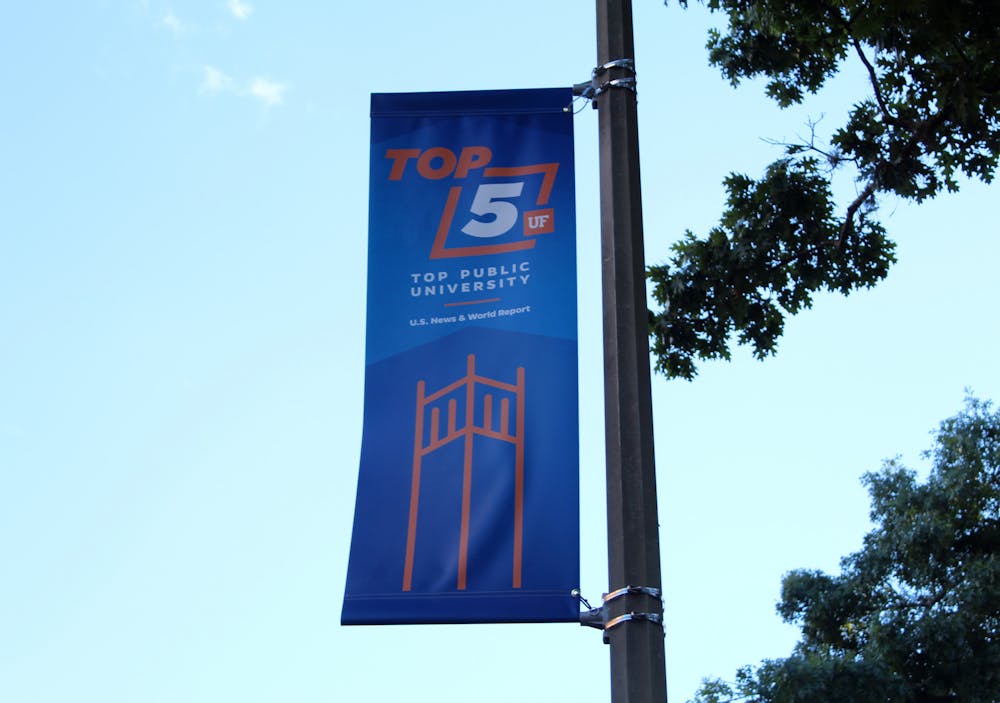For the first time in its history, UF will be mandated to shop for accreditors between now and 2025.
Accreditation systems provide a list of standards to guarantee a high quality of education, which member universities must abide by to maintain their accreditation.
Aside from lending credence to the institution, accreditation also ensures students have access to federal financial aid, said Andrew Gothard, president of United Faculty of Florida.
“It's a very big deal,” Gothard said. “And not something that ill-informed politicians should be playing games with.”
The changes to accreditation come in light of Senate Bill 7044, which requires Florida universities to seek new accreditors every five years and prohibits them from maintaining the same accreditor two cycles in a row.
The first to face new accreditation are the University of Central Florida and Florida Polytechnic University, which will transition in 2023. UF and three others will make the change in 2025.
The Florida Board of Governors is tasked with finding potential accreditors for universities, a list from which universities can choose which accreditation to apply for, according to SB 7044. Universities aren’t all required to choose the same accreditor, said Renee Fargason, a Florida BOG spokesperson.
Some Florida university presidents, including UF President Kent Fuchs, discussed accreditation during a closed-door meeting in Tallahassee in December, according to reporting from the Tallahassee Democrat. UF officials declined to comment on the meeting or its topic.
UF declined to comment on the status of the search for new accreditors.
UF shares its current accreditor, the Southern Association of Colleges and Schools Commission on Colleges, with 108 other Florida colleges and universities. SACSCOC is one of six regional accreditors whose member universities typically reside within their region.
Accreditors may investigate universities for potential breaches of contract, as was the case for a suspected conflict of interest during Florida State University’s 2021 presidential search and during a potential restriction of academic freedom at UF later that year. Universities are also partially protected from government influence by such investigations, Gothard said.
All regional accreditors must meet the U.S. Department of Education’s standards, including those outlined for faculty, student achievement, and academic programs, according to a BOG information packet.
To switch accreditors, universities must provide the USDOE with a reasonable cause for the change and receive its approval. They then must apply for and receive membership to their new accrediting body before formally notifying USDOE of the change.
Since a 2020 change allowing universities to seek accreditation outside their region, some universities have transitioned to different accreditors. The change paved the way for Florida’s SB 7044, which allows accreditation changes outside the region and bars universities from using the same accreditor in consecutive cycles.
Past clashes between the Florida government and SACSCOC, including over the UF and FSU investigations, have been Gothard’s suspected causes of the bill, he said.
“This was a reaction to punish SACSCOC for enforcing rules that would keep politicians out of our higher education classrooms and off of our campuses,” Gothard said. “It came from a place of bitterness and anger, and that's why it is not helpful.”
One possibility remains for Florida institutions to remain with SACSCOC: SB 7044 allows universities to stay with the same accreditor “under certain circumstances,” provided they exhausted every other option. The amendment ensures Florida universities would not lose accreditation entirely in case no other accrediting institution accepts them, Gothard said.
Gothard and UFF worked hard to add the amendment to SB 7044, he said. Potentially losing accreditation would disqualify students’ degrees and revoke access to federal financial aid.
“Even if some of our legislators are blinding themselves to the consequences of this, we wanted to make sure that Florida students were protected,” Gothard said.
Changing accreditors will cause a temporary rise in university expenses, according to the BOG presentation. While the presentation claims the change shouldn’t cause major expense changes long-term, SACSCOC requires the lowest cost in dues and fees of any other regional accreditor. A change to any other accreditor will result in a rise in costs for the university.
SACSCOC would suffer a loss of over $1 million — or 8.6% of its 2021 revenue — if all Florida universities transition away from the organization, president of SACSCOC Belle Wheelan wrote in an email.
UF President-elect Ben Sasse finds accreditation systems limit a university’s potential and stifle innovation, he wrote in a 2022 article for The Atlantic. He called for either radical reform or a complete overhaul of accreditation “cartels,” he wrote, to encourage individuality in higher education.
“Much of the monotony in higher education is a result of the accreditation process,” Sasse wrote. “Accreditation should protect students from snake-oil salesmen, but unfortunately it has become its own racket.”
But UFF-UF Vice President Meera Sitharam sees accreditation as a long-term process during which a university repeatedly self-evaluates and makes changes to improve its quality, she said.
“It's not like somebody coming and giving you a golden seal of approval,” Sitharam said. “It's like a feedback cycle. You do something, you see what the effect of that is and then you change it.”
Contact Alissa Gary at agary@alligator.org. Follow her on Twitter @AlissaGary.

Alissa is a sophomore journalism major and University Editor at The Alligator. She has previously covered student government, university administration and K-12 education. In her free time, she enjoys showing photos of her cats to strangers.






